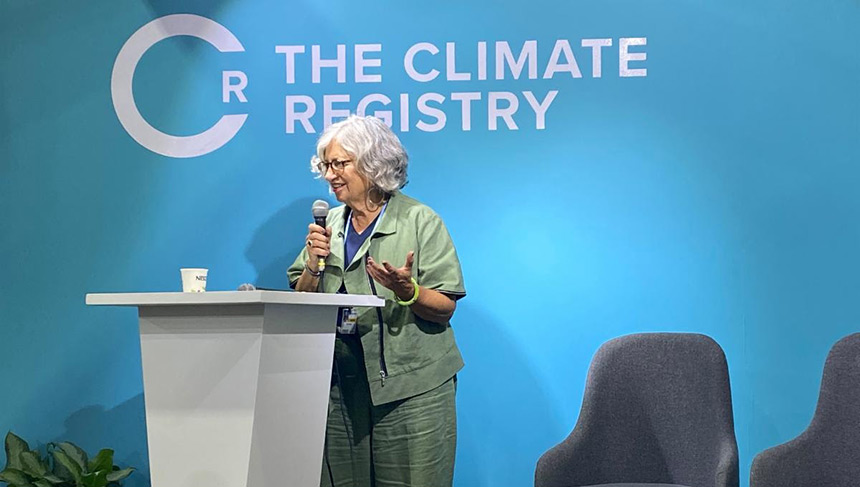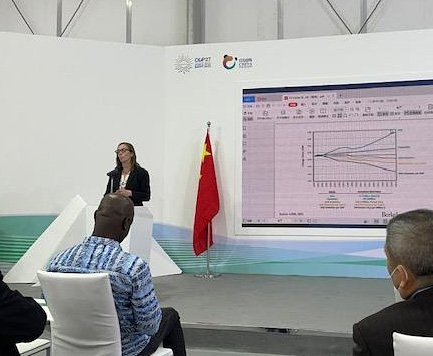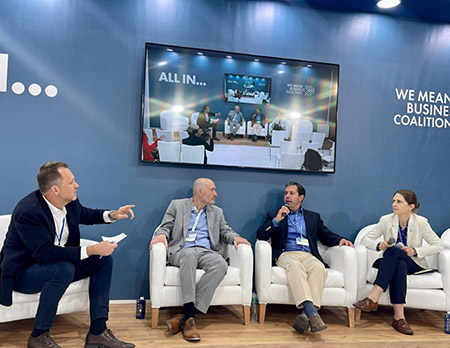
By Andrew Cohen
They met with leaders from all over the world, confronted a bevy of vital issues, and delved into their complexities. But throughout the recent United Nations Climate Change Conference (COP27) in Egypt, Berkeley Law’s experts sounded a common theme.
“We must work together to confront this crisis,” said Mary Nichols, vice chair of the school’s California-China Climate Institute.
Launched in 2019 and housed jointly at Berkeley Law through its Center for Law, Energy & the Environment (CLEE) and UC Berkeley’s Rausser College of Natural Resources, the institute led several events and meetings to advance partnership and dialogue between the U.S. and China — culminating in the announcement that both countries will resume climate talks.
“We welcome the progress we’ve seen … and stand ready to do our part to advance collaboration at every level,” Nichols said.
Working with Tsinghua University’s Institute of Climate Change and Sustainable Development and other UC campuses and departments, the institute strives to inform policymakers, foster cooperation and partnership, and drive climate solutions through research, training, and dialogue.

Joining Nichols in Egypt to push forward climate action was CLEE Executive Director Louise Bedsworth (also a senior advisor to the institute), CLEE Climate Program Director Ethan Elkind, and institute Senior Climate Policy Fellows Jenn Perron and Jessica Gordon. Collectively, they convened and participated in several events.
“Advancing effective climate solutions is central to CLEE’s mission, so it was really exciting to have such a large presence at the conference this year,” Bedsworth said. “We conduct our work in close collaboration with policymakers and other stakeholders, so we’re well-positioned to convene and participate in a number of events. Being home to the California-China Climate Institute also provides us with a unique opportunity to support collaboration between California and Chinese partners, which is especially important at this time.”
Elkind noted that the gathering shined a valuable public spotlight on progress to date — or lack thereof — of each country’s climate commitments.
“We need that accountability and public scrutiny to hold leaders’ feet to the fire on climate action,” he said.
Across the spectrum
The CLEE-led events focused on U.S.-China synergies in co-control of air pollution and climate change, California’s subnational climate leadership (see it here), a discussion on university-led collaborative research partnerships to advance equitable science (including methane reductions), and accelerating nature-based climate solutions across California and China (see it here).
There were also three press conferences that addressed U.S.-China collaboration in decarbonization solutions, a session on strategic opportunities for China’s decarbonization, and other related discussions and receptions.

Elkind moderated a panel co-organized with the global Transport Decarbonisation Alliance — which works to implement the 2015 U.N. Paris agreement to reduce emissions from transportation — that focused on zero-emission vehicles’ charging infrastructure and circularity (see it here). CLEE is supporting the California Air Resources Board in its current role as alliance chair, helping to provide research, outreach, and education on the state’s success stories related to transportation emissions.
“California is pioneering a regulatory and incentive approach to phase out fossil fuel trucks and other medium- and heavy-duty vehicles,” Elkind said. “That will require deploying major charging infrastructure to fuel these trucks with electricity, and hydrogen in some cases, in a way that’s comparable to gasoline in terms of cost and time.
“The panel I moderated explored best practices for getting these charging stations built. It’s important that the rest of the world learn about our approach in California and follow suit, as well as for California to learn from other leaders. That way the market for these trucks will be truly global in nature, which will decrease costs for everyone through economies of scale.”
Partners at the CLEE and institute events included the Asian Development Bank, California Energy Commission, California Legislature, California Public Utilities Commission, California State Transportation Agency, Chinese Ministry of Ecology and Environment, Columbia University, Innovation Center for Energy and Transportation, Innovative Green Development Program, Lawrence Berkeley National Laboratory, Nature Conservancy, Peking University, U.S. Climate Alliance, and World Bank.
Before the conference, institute Chair and former California Gov. Jerry Brown called for stronger cooperation between the U.S. and China, the world’s top two producers of greenhouse gas emissions.
“A major theme of this conference was implementation, which is the critical element to achieve the emission reductions needed to slow the impacts of global warming,” Bedsworth said. “Almost all of CLEE’s work centers around informing, designing, and implementing practical and effective climate solutions. So I see us continuing to play a large role in supporting implementation, especially at the local, state, and provincial level.”